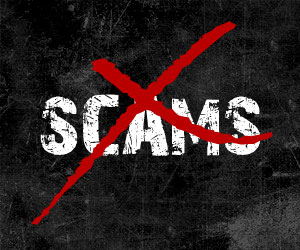
You can dream about it, you can plan for it, but when that day comes and you’re holding the winning ticket, you can’t believe it!
Most people can barely process a big win. They’re stunned, happy, and overwhelmed. It’s hard to take a step back from all the emotion and think about protecting yourself from those who want to take advantage of your massive luck.
In Canada, winners are not allowed to remain anonymous unless they have proof of extreme or life-threatening circumstances, so there’s nothing stopping people from looking up lotto winners and asking them for money.
Recent winners Lotto 6/49 winners Robin Walker and Brett McCoy from the tiny town of Peers, Alberta could have avoided a lot of drama if they had been allowed to remain anonymous. In September of 2017, they won $60 million, which was the biggest lotto win in Alberta’s history.
At first they stayed anonymous, but in a town with a population of 98, rumors were swirling! Soon the news broke and the ex-husband decided he wanted a share of the money.
Robin Walker had been estranged from her husband since 2009, but technically they were still married. So, he took her to court, asking for $15 million of the $60 million win. Thankfully the court ruled in Walker’s favour and she wasn’t required to give her ex any money–or pay any legal fees.
Which goes to show you that the ex’s claim was completely ridiculous. Unfortunately for Robin and Brett, the trouble didn’t stop at that. Lottery scammers used their names to rob people and steal their identities! It’s a common scamming technique to use lottery winners’ names in what’s called an advanced fee scam.
Scammers have been sending people an email claiming to be Robin Walker and Brett McCoy, saying that they want to give away some of their winnings and, lucky for you, they want to give you a million dollars! All you have to do is send money to cover the fees and processing expenses of transferring the funds.
The lottery scammers will say that the fees need to be paid in advance and cannot be taken out of the million dollar donation. Scammers also ask for personal and financial information. It’s not just about the money, they’re also stealing people’s identities!
Victims can look Robin and Brett up online, see that they’ve won all that money, and how kind and down-to-earth they seem. What they don’t know is that it’s extremely unlikely that they would want to give their money away to complete strangers.
After the “fees” are paid, the scammers disappear, along with the money they promised (but never had in the first place).
Robin and Brett never thought that they would be going to their local store for chicken feed and coming out with $60 million, but they also probably never thought winning the lottery would be so problematic. In a small town, it was likely that people (like Robin’s ex) were going to find out about the big win, but if they had been anonymous, their names wouldn’t have been dragged through the mud by online lottery scammers.
So, if you find yourself holding that winning ticket, think about protecting yourself from predators and scammers by remaining anonymous. Learn how in our other posts on the subject.
Feature image courtesy of Widjaya Ivan https://flic.kr/p/8oqPcQ
Author: Danielle Mohr
Danielle is a professional copywriter and editor who provides services to Jackpot Lawyer on a contract basis. She has a broad range of experience in business marketing and is highly motivated to help businesses generate leads, increase sales, and promote growth.
Danielle has worked on websites, corporate blogs, and manuals for professionals, trades, government-funded organizations, and international corporations. Her work is driven by a strong passion for continued learning and she enjoys the challenge that comes with forging connections in the digital realm.
Danielle is the owner of Fine Point Writing & Editing based in Edmonton, Alberta.

3 comments on “Lottery Scammers: A 60 Million Dollar Headache”
Iv had a phone call telling me iv won the Canada inhouse lottery how do I inquire about it I think it is a scam
Be wary of any unsolicited calls or messages telling you that you have won money. You may want to call your lottery regulator to ask about any suspicious “lotteries”.
Check out the real mccoy story. The ex husbands lawyers took the case back to court and won. I’d love to know how much. And who the judge was.
Comments are closed.